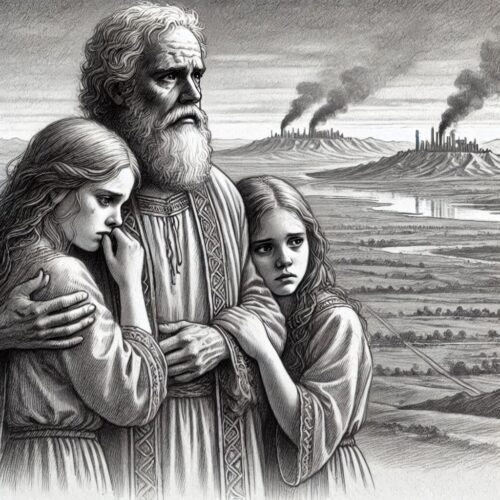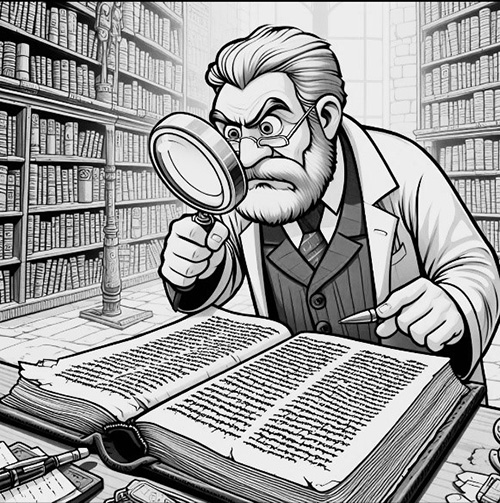Why Did God Destroy Sodom and Gomorrah? The Full Story
Why Did God Destroy Sodom and Gomorrah? The biblical account of Sodom and Gomorrah’s destruction ranks among Scripture’s most dramatic demonstrations of divine judgement. While often referenced in modern discourse, the true nature of Sodom’s sin and its destruction’s significance deserve careful examination. Let’s explore Reformed views on the Genesis 19 account.
The Historical and Biblical Context
Sodom and Gomorrah stood in what scholars believe was the fertile Jordan Valley, near the Dead Sea’s southern end. Recent archaeological discoveries have provided intriguing evidence supporting the biblical narrative. Most notably, excavations at Tall el-Hammam, an ancient city in the Jordan Valley, revealed signs of catastrophic destruction around 1650 BCE. Researchers discovered evidence of:
- Temperatures exceeding 2,000°C
- A destruction layer containing shocked quartz
- Melted pottery and building materials
- Unusual deposits of salt and sulphur.
The scientific evidence, published in “Scientific Reports” (2021), suggests a cosmic airburst that matches the biblical description of fire and brimstone from heaven. While scholars continue to debate whether Tall el-Hammam is definitively Sodom, the physical evidence aligns remarkably with the biblical account of sudden, catastrophic destruction.
Biblical References Excluding Genesis
While Genesis 19 provides the primary narrative, Scripture offers multiple perspectives on Sodom’s sin. Ezekiel 16:49-50 provides perhaps the most comprehensive indictment: “Now this was the sin of your sister Sodom: She and her daughters were arrogant, overfed and unconcerned; they did not help the poor and needy. They were haughty and did detestable things before me.”
Jesus himself references Sodom in His teachings about judgement (Matthew 10:15, Luke 10:12). Peter cites the cities as an example of God’s judgement on the ungodly while preserving the righteous (2 Peter 2:6-8). Jude echoes this theme, adding the cities serve as an example of those who “indulged in sexual immorality and pursued unnatural desire” (Jude 1:7).
The Multiple Dimensions of Sodom’s Sin
The sin of Sodom was not a singular transgression but rather, a complex web of moral, social, and spiritual failures that demonstrated total rebellion against God’s order. To fully understand God’s judgement, we must examine the multi-layered nature of Sodom’s wickedness as revealed throughout Scripture.
- Pride and Prosperity: Sodom’s first sin was pride, born of material abundance. The city enjoyed exceptional prosperity but used its wealth for self-indulgence rather than service to God and neighbour. This mirrors the warning in Deuteronomy 8 about the dangers of forgetting God in times of plenty. Their economic success led to spiritual failure – a pattern repeatedly warned against in Scripture.
- Social Injustice: The Ezekiel passage reveals that Sodom’s inhabitants ignored the poor and needy despite their abundance. This violation of hospitality—a crucial ancient Near Eastern virtue—reflected a deeper rejection of God’s moral order. The attempted assault on Lot’s guests represents the culmination of this systematic disregard for human dignity.
- Sexual Immorality: Genesis 19’s account describes the attempted assault on Lot’s angelic visitors, revealing how far Sodom had fallen. The sin wasn’t merely sexual immorality but reflected a complete rejection of God’s created order and human dignity. This total moral corruption demonstrated the depths of depravity possible when a society completely rejects divine authority.
- Covenant Unfaithfulness: Ultimately, Sodom’s various sins stemmed from a fundamental rejection of God’s authority. Though not in formal covenant with God like Israel, Sodom violated the natural law written on human hearts (Romans 1:18-32). Their behaviour demonstrated total rebellion against both divine and natural law.
John Calvin observes in his commentary on Genesis: “The destruction of Sodom is a signal example of divine judgement… that we may know God is the just avenger of the wickedness of the world.” This Reformed perspective emphasises Sodom’s judgement wasn’t merely punitive but demonstrative of God’s righteous character.
Why Did God Destroy Sodom? A Reformed Theological Analysis
Reformed theology understands Sodom’s judgement through several key doctrinal lenses. Total depravity, for instance, explains how a society can progressively reject God’s truth until reaching complete moral bankruptcy.
Jonathan Edwards, in his famous sermon “Sinners in the Hands of an Angry God,” draws a powerful parallel: “What are we, that we should think to stand before him, at whose rebuke the earth trembles, and before whom the rocks are thrown down?”
Matthew Henry provides pastoral insight: he notes “Lot’s deliverance from Sodom is a figure of the salvation of all God’s people, from the ruins of a wicked world.” This interpretation aligns with Reformed covenant theology, seeing in Sodom’s destruction a type of the final judgement while highlighting God’s mercy toward His people.
God’s sovereignty is displayed both in judgement and in the mercy shown to Lot’s family. The physical evidence of destruction discovered by archaeologists—the intense heat, the sudden devastation, the unusual mineral deposits—aligns with the biblical description of divine intervention, reminding us God’s judgements are supernatural, yet tangible.
Conclusion: Why Did God Destroy Sodom?
The destruction of Sodom and Gomorrah is more than just a historical event or moral tale. It reveals fundamental truths about human nature, divine justice, and the consequences of rejecting God’s moral order. The account offers a sobering reminder that God judges not just individual sins but systemic rejection of His authority.
Yet within this account of judgement, we find hope. Just as God rescued Lot before the destruction, He continues to save those who trust in Him. The story points ultimately to our need for the gospel—the only solution to human depravity and the only hope for true righteousness.
The lesson of Sodom remains relevant: societies that reject God’s authority and moral order face judgement, while God rescues those that trust in Him. In an age that increasingly parallels Sodom’s rebellion, this ancient account speaks with renewed relevance to contemporary hearts.
The convergence of archaeological evidence with the biblical narrative provides additional weight to this ancient account. As Matthew Henry reminds us, this story isn’t merely historical but prophetic—a warning to future generations about the reality of divine judgement and the certainty of divine rescue for God’s people.
Why Did God Destroy Sodom?—Related FAQs
Why was Lot’s wife turned into a pillar of salt? Lot’s wife’s transformation into salt symbolises the consequence of having one’s heart still attached to a sinful world despite receiving God’s mercy. Her looking back represented more than mere curiosity—it demonstrated a divided heart, longing for the very things God was judging. This serves as a warning about the danger of half-hearted obedience to God’s commands (Luke 17:32).
Did Abraham’s intercession for Sodom fail? Abraham’s intercession actually succeeded in its true purpose—to demonstrate God’s perfect justice and to rescue the righteous. God honoured the principle behind Abraham’s prayer by rescuing Lot’s family, showing He never destroys the righteous with the wicked. This account teaches us about both the power and proper aims of intercessory prayer.
Were there children in Sodom and Gomorrah when God destroyed it? Reformed theology understands God’s judgement on Sodom, while including all its inhabitants, was perfectly just and sovereign. Children who died in the destruction would have been under the federal headship of their parents, similar to how Reformed theology understands original sin and covenant relationships. This difficult truth points us to the necessity of Christ’s redemption and God’s mercy in salvation.
How should Christians apply the lesson of Sodom to modern cities? Modern cities, like Sodom, can become centres of both great blessing and great wickedness. Rather than calling for judgement, Christians are called to be salt and light within their cities, working for their peace and prosperity while maintaining biblical distinctiveness. The Reformed doctrine of common grace helps us understand how to engage with culture while remaining faithful to God’s truth (Matthew 5:13-16).
Why did Lot offer his daughters to the mob? Lot’s offer of his daughters reflects the horrific moral compromise that can result from long-term exposure to a godless culture. While the Bible records this action, it doesn’t commend it—instead, it shows how even believers can become morally confused when they accommodate themselves to worldly values. This serves as a warning about the danger of cultural assimilation.
What does Peter mean when he says Lot was “tormented” by the lawless deeds he saw? Peter’s description in 2 Peter 2:7-8 shows true believers, even when compromised, still maintain an inner revulsion toward sin. Lot’s torment demonstrates that genuine faith, while sometimes weak and inconsistent, still produces a fundamental alienation from wickedness. This offers both warning and comfort to believers struggling to maintain their testimony in ungodly environments.
How should we understand God’s “investigation” of Sodom’s sin in Genesis 18? God’s statement about “going down to see” Sodom’s sin wasn’t due to any lack of knowledge but was a demonstration of His perfect justice and patience. This anthropomorphic description shows that God’s judgments are never hasty or arbitrary but are always based on perfect knowledge and righteousness. It also provided an opportunity for Abraham’s intercession, teaching us about God’s willingness to engage with His people’s prayers.
Why Did God Destroy Sodom?— Our Related Posts
Editor's Pick

The Throne-Room Vision: Who Did Isaiah See?
The scene is unforgettable: Isaiah stands in the temple, and suddenly the veil between heaven and earth tears open. He [...]

The Angel of the Lord: Can We Be Certain It Was Christ All Along?
Throughout the Old Testament, a mysterious figure appears: the Angel of the LORD. He speaks as God, bears God’s name, [...]
SUPPORT US:
Feel the Holy Spirit's gentle nudge to partner with us?
Donate Online:
Account Name: TRUTHS TO DIE FOR FOUNDATION
Account Number: 10243565459
Bank IFSC: IDFB0043391
Bank Name: IDFC FIRST BANK






